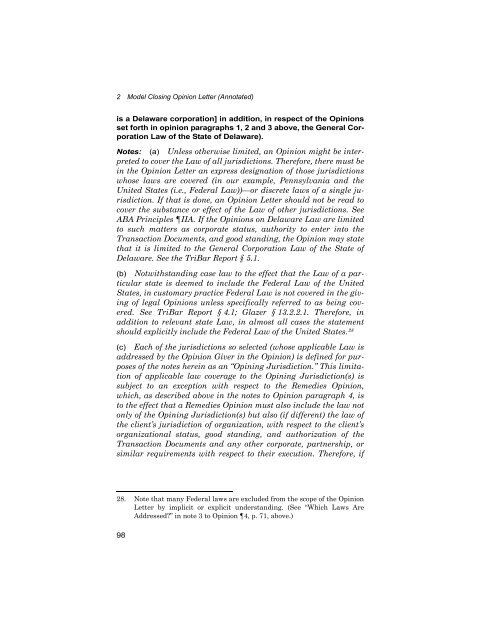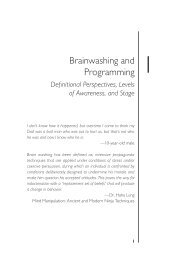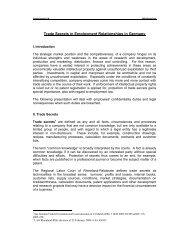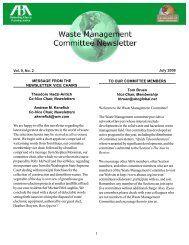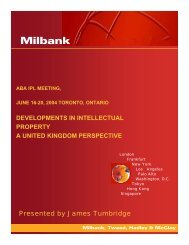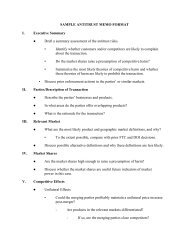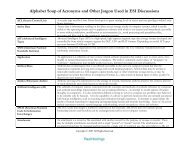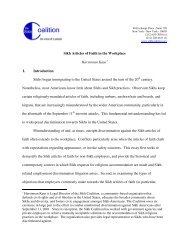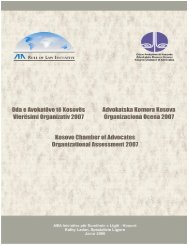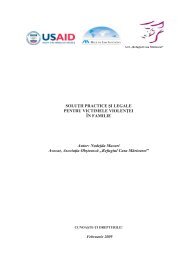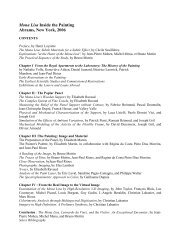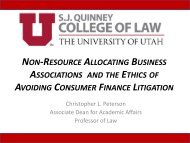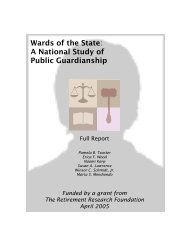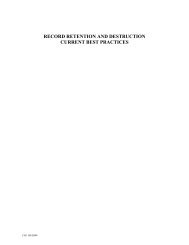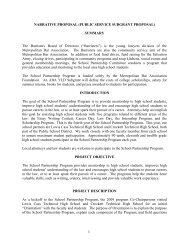Model Closing Opinion Letter (Annotated) - American Bar Association
Model Closing Opinion Letter (Annotated) - American Bar Association
Model Closing Opinion Letter (Annotated) - American Bar Association
You also want an ePaper? Increase the reach of your titles
YUMPU automatically turns print PDFs into web optimized ePapers that Google loves.
2 <strong>Model</strong> <strong>Closing</strong> <strong>Opinion</strong> <strong>Letter</strong> (<strong>Annotated</strong>)<br />
is a Delaware corporation] in addition, in respect of the <strong>Opinion</strong>s<br />
set forth in opinion paragraphs 1, 2 and 3 above, the General Corporation<br />
Law of the State of Delaware).<br />
Notes: (a) Unless otherwise limited, an <strong>Opinion</strong> might be interpreted<br />
to cover the Law of all jurisdictions. Therefore, there must be<br />
in the <strong>Opinion</strong> <strong>Letter</strong> an express designation of those jurisdictions<br />
whose laws are covered (in our example, Pennsylvania and the<br />
United States (i.e., Federal Law))—or discrete laws of a single jurisdiction.<br />
If that is done, an <strong>Opinion</strong> <strong>Letter</strong> should not be read to<br />
cover the substance or effect of the Law of other jurisdictions. See<br />
ABA Principles IIA. If the <strong>Opinion</strong>s on Delaware Law are limited<br />
to such matters as corporate status, authority to enter into the<br />
Transaction Documents, and good standing, the <strong>Opinion</strong> may state<br />
that it is limited to the General Corporation Law of the State of<br />
Delaware. See the Tri<strong>Bar</strong> Report § 5.1.<br />
(b) Notwithstanding case law to the effect that the Law of a particular<br />
state is deemed to include the Federal Law of the United<br />
States, in customary practice Federal Law is not covered in the giving<br />
of legal <strong>Opinion</strong>s unless specifically referred to as being covered.<br />
See Tri<strong>Bar</strong> Report § 4.1; Glazer § 13.2.2.1. Therefore, in<br />
addition to relevant state Law, in almost all cases the statement<br />
should explicitly include the Federal Law of the United States. 28<br />
(c) Each of the jurisdictions so selected (whose applicable Law is<br />
addressed by the <strong>Opinion</strong> Giver in the <strong>Opinion</strong>) is defined for purposes<br />
of the notes herein as an “Opining Jurisdiction.” This limitation<br />
of applicable law coverage to the Opining Jurisdiction(s) is<br />
subject to an exception with respect to the Remedies <strong>Opinion</strong>,<br />
which, as described above in the notes to <strong>Opinion</strong> paragraph 4, is<br />
to the effect that a Remedies <strong>Opinion</strong> must also include the law not<br />
only of the Opining Jurisdiction(s) but also (if different) the law of<br />
the client’s jurisdiction of organization, with respect to the client’s<br />
organizational status, good standing, and authorization of the<br />
Transaction Documents and any other corporate, partnership, or<br />
similar requirements with respect to their execution. Therefore, if<br />
28. Note that many Federal laws are excluded from the scope of the <strong>Opinion</strong><br />
<strong>Letter</strong> by implicit or explicit understanding. (See “Which Laws Are<br />
Addressed?” in note 3 to <strong>Opinion</strong> 4, p. 71, above.)<br />
98


